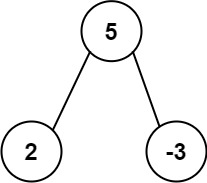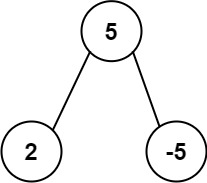Most Frequent Subtree Sum - Plain and simple DFS
Problem Statement:
Given the root of a binary tree, return the most frequent subtree sum. If there is a tie, return all the values with the highest frequency in any order.
The subtree sum of a node is defined as the sum of all the node values formed by the subtree rooted at that node (including the node itself).
Example 1:

Input: root = [5,2,-3] Output: [2,-3,4]
Example 2:

Input: root = [5,2,-5] Output: [2]
Constraints:
- The number of nodes in the tree is in the range
[1, 104]. -105 <= Node.val <= 105
Solution:
Basically there are two steps to this:
- Creating a frquency map of subtree sums
- Finding the key or keys with maximum value in a frequency map.
For first part, we can modify the basic DFS to maintain subtree sums and also increment a frequency map.
For the second part, we just iterate the frequency map to get the key or keys with maximum value.
class Solution {
unordered_map<int,int> H;
int dfs(TreeNode *root)
{
if(!root) return 0;
int cur = root->val + dfs(root->left) + dfs(root->right);
H[cur]++;
return cur;
}
public:
vector<int> findFrequentTreeSum(TreeNode* root)
{
dfs(root);
vector<int> res;
int curMax = 0;
for(auto &[k,v]: H)
{
if(v<curMax) continue;
if(v==curMax){res.push_back(k); continue;}
curMax = v;
res.clear();
res.push_back(k);
}
return res;
}
};